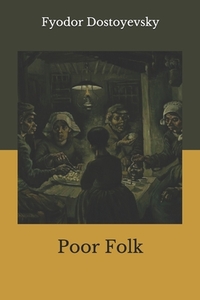You need to sign in or sign up before continuing.
Take a photo of a barcode or cover
Bugün can sıkıntısı ve hüzünden başka bir şey hissetmiyorum. Böyle bir gün işte. Hoşça kalın.
Dostoyevski’nin ilk romanı insancıklar; ilk Rus toplumsal romanı sayılıyormuş. 2 akraba olan Varvara Alekseyevna ile yaşlı ve fakir bir katip olan akrabası Makar Devuşkin’in mektuplaşmaları şeklinde ilerliyor. Acı, hüzün, sefalet bana göre romanın asıl baş kahramanları ve böyle bir romanı okumak için yanlış bir zaman seçmişim gibi geliyor.
Dostoyevski’nin ilk romanı insancıklar; ilk Rus toplumsal romanı sayılıyormuş. 2 akraba olan Varvara Alekseyevna ile yaşlı ve fakir bir katip olan akrabası Makar Devuşkin’in mektuplaşmaları şeklinde ilerliyor. Acı, hüzün, sefalet bana göre romanın asıl baş kahramanları ve böyle bir romanı okumak için yanlış bir zaman seçmişim gibi geliyor.
sad
slow-paced
Plot or Character Driven:
Character
Strong character development:
No
Loveable characters:
No
Diverse cast of characters:
No
Flaws of characters a main focus:
No
dark
emotional
reflective
sad
medium-paced
Plot or Character Driven:
Character
Strong character development:
Complicated
Loveable characters:
Yes
Diverse cast of characters:
No
Flaws of characters a main focus:
Complicated
Anche qui, sono 3,5* a essere precisi. Il primo racconto di Dostoevskij arriva in un periodo della sua vita dominato dal cambiamento. Si era licenziato dal suo primo lavoro, aveva debiti presumibilmente di gioco e stava cercando di metter su col fratello e un amico un giro di traduzioni. In una lettera al fratello si dice soddisfattissimo di questo racconto e ne ha ben motivo. Scritto, credo, sulla scia di Puškin, mette sotto i riflettori la "povera gente" ossia quelli che meritano di esser rovesciati come un guanto, a detta dei ricchi.
Il primo dei tanti ritratti impietosi dipinti dal genio di Dostoevskij.
C'è forse un'oncia di salvezza al mondo, ma non è per tutti.
Il primo dei tanti ritratti impietosi dipinti dal genio di Dostoevskij.
C'è forse un'oncia di salvezza al mondo, ma non è per tutti.
meu deus dosto que livro foi esse ainda bem q tu melhorou com o tempo
It was really interesting to read Dostoevsky’s first novel and see what he themes he chose to write about in his early years (I was not expecting a love story!). It is clear that *Poor Folk* was written by a less experienced writer as compared to Dostoevsky’s greater works later in life, like *Demons* and *TBK*; the form is less mature, somewhat more repetitive, and less complex plot-wise.
Still, Dostoevsky addresses deeper themes that consistently reemerge in his later work. The motifs of religion, destitution, duality of body and soul, and the role of women appear in *Poor Folk* as it does in his other works. The novel is a poignant reminder of every society's suffering and inequality. And as always, the novel intertwines multiple stories, several of which that are deeply moving.
Still, Dostoevsky addresses deeper themes that consistently reemerge in his later work. The motifs of religion, destitution, duality of body and soul, and the role of women appear in *Poor Folk* as it does in his other works. The novel is a poignant reminder of every society's suffering and inequality. And as always, the novel intertwines multiple stories, several of which that are deeply moving.
emotional
reflective
sad
medium-paced
Plot or Character Driven:
Character
Strong character development:
Yes
Loveable characters:
Yes
Diverse cast of characters:
No
Flaws of characters a main focus:
Yes
challenging
reflective
sad
slow-paced
Plot or Character Driven:
Character
Strong character development:
Complicated
Loveable characters:
No
Diverse cast of characters:
No
Flaws of characters a main focus:
Yes
reflective
sad
slow-paced
Plot or Character Driven:
Character
Loveable characters:
Complicated
Diverse cast of characters:
No
Flaws of characters a main focus:
No
sad
medium-paced
Plot or Character Driven:
Character
Strong character development:
Yes
Loveable characters:
Yes
Diverse cast of characters:
No
Flaws of characters a main focus:
Yes




